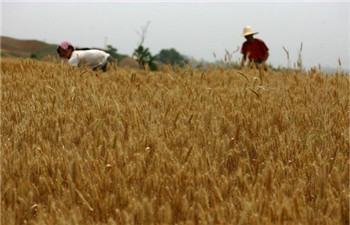(单词翻译:单击)

A Chinese province is buying up mouldy and damaged wheat at above market prices in an effort to assist flood-hit farmers that will further degrade the quality of grain in China’s state reserves system.
中国一个省正以高于市场的价格收储发霉损坏的小麦,以求帮助遭受洪灾的农民,但此举将进一步降低中国国家储备体系的储备粮质量。
Starting this week, Anhui has established a temporary reserve to buy wheat with up to 20 per cent substandard kernels, above the normal 10 per cent limit, for prices up to 46 per cent above the market price. The purchase plan will run through to August.
安徽省本周启动小麦临时收储,收购含有至多20%不完善粒的小麦,高于正常的10%上限,而价格高出市场价格至多46%。这个小麦临时收储方案将执行至8月底。
Torrential rains and a huge tornado have killed about 300 people this summer along the Yangtze River valley and in northern China’s jagged Taiheng mountains. The flooding has badly damaged the wheat crop in Anhui province, the nation’s third-largest producer.
今年夏天,暴雨和一场巨大的龙卷风已在长江流域和锯齿形的华北太行山地区造成约300人遇难。洪水已严重损坏安徽省(全国第三大产地)的小麦作物。
While temporarily underpinning growers’ revenues, the purchases could compound China’s sticky problem of excess grain stockpiles. Beijing this year halted a programme to buy corn at above-market prices, which had distorted global markets and left China with a surplus of grain of dubious quality.
尽管此举可以暂时支撑种植者的收入,但这些收购可能加剧中国粮食库存过剩的棘手问题。今年北京方面叫停了一个以高于市场的价格收储玉米的计划,此前该计划扭曲了全球市场,并使中国拥有过多质量可疑的谷物。
Anhui expects to purchase 500,000 tonnes of the poor-quality wheat, more than twice the amount the province bought through its temporary reserves programme last year.
安徽预计将购买50万吨劣质小麦,是该省去年临时收储计划购买量的两倍多。
“The government wanted to let the market digest the substandard wheat at first, but given the recent flood it has decided to limit farmers’ losses by imposing this temporary purchasing policy,” an official from Anhui’s provincial grain authority said.
“政府最初希望让市场消化掉不合格的小麦,但鉴于近期的洪水,政府决定通过实施这项临时收储政策,限制农民的损失,”安徽省粮食主管部门的一位官员表示。
He added that the cost of the measure had initially delayed its implementation. “We need to protect farmers’ interests but we also need to cut the government’s fiscal burden,” he said. “The government has a huge fiscal burden.”
他补充说,这项措施的成本最初推迟了它的实施。“我们需要保护农民的利益,但我们也需要减轻政府的财政负担,”他表示,“政府有巨大的财政负担。”
In recent years, wheat grown in Anhui had flowed into normal markets, local farmers said, rather than the state reserves set up to prop up prices at harvest time and provide supply during shortages. The low level of state buying in Anhui contrasted with neighbouring Henan, the nation’s top producer, where Chinese journalists have witnessed farmers pressing reserve officials to buy sprouted or mouldy wheat.
当地农民表示,近年安徽省种植的小麦流入正常市场,而不是国家收储体系;后者的目的是在丰收时支撑价格,在歉收时提供货源。安徽省低水平的国家收储与邻近的河南省(全国最大产地)形成对比;中国记者曾在河南省目睹农民们殷切要求收储官员买下发芽或发霉变质的小麦。
“It’s mainly because of the rainy weather. When the farmers harvested the wheat it was raining all the time and hence they couldn’t properly dry it. Some of the wheat went bad,” the Anhui grains official said.
“这主要是因为阴雨天气。当农民们收割小麦时,雨下个不停,因此他们无法让小麦好好干燥。一些小麦坏了,”上述安徽省粮食官员表示。
The floods have also dented demand for feed grains, the normal use for wheat too spoilt to make into bread or noodles. Flooding along the Yangtze and in eastern China knocked out pig and poultry farms, thus reducing demand for feed.
洪水还削弱了对饲料粮的需求;变质程度使其不适合做成馒头或面条的小麦,通常被用作饲料粮。长江流域和华东的洪灾冲毁了养猪场和家禽养殖场,从而降低了饲料需求。


